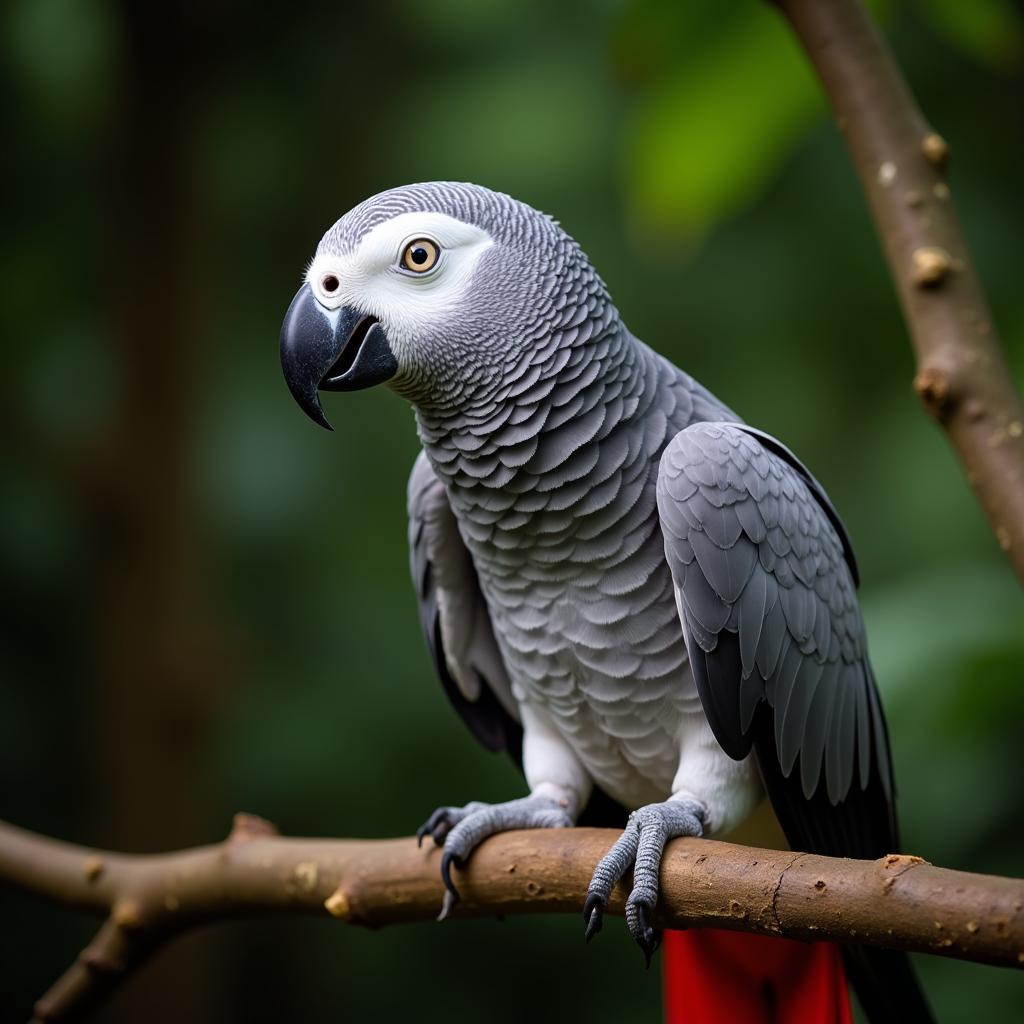African Grey Parrot: An Endangered Species Facing Extinction
The African grey parrot, renowned for its intelligence and ability to mimic human speech, is sadly facing a grave threat of extinction. Habitat loss, illegal trapping for the pet trade, and climate change are pushing these remarkable birds towards a precarious future. This article delves into the factors driving the decline of the African grey parrot, the conservation efforts underway, and what we can do to help.
The African Grey Parrot: An Intelligent and Social Creature
 African Grey Parrot Perched on a Branch
African Grey Parrot Perched on a Branch
African grey parrots (Psittacus erithacus) are medium-sized parrots native to the rainforests of Central and West Africa. Their silver-grey plumage, bright red tail feathers, and remarkable intelligence set them apart. These parrots are highly social animals, living in flocks and forming strong bonds with their mates.
What truly distinguishes the African grey is its exceptional cognitive ability. They possess the intellectual capacity of a human toddler and can learn hundreds of words, mimicking human speech with astonishing accuracy. Their problem-solving skills and emotional intelligence have made them a subject of fascination for scientists and bird enthusiasts alike.
The Perilous Path to Endangered Status
Sadly, the very qualities that make African grey parrots so captivating have also contributed to their decline. Their intelligence and talking ability make them highly sought-after pets, fueling a lucrative illegal trade. Trappers often capture these birds from the wild, subjecting them to inhumane conditions and decimating wild populations.
 Deforestation in African Rainforest
Deforestation in African Rainforest
Habitat loss due to deforestation for agriculture, logging, and mining poses another significant threat. As their rainforest homes vanish, African grey parrots lose crucial nesting sites and food sources. Climate change further exacerbates the situation, altering rainfall patterns and increasing the frequency of droughts and wildfires, further degrading their habitat.
The Fight to Save the African Grey Parrot
Recognizing the dire situation, the International Union for Conservation of Nature (IUCN) classifies the African grey parrot as an endangered species. This designation highlights the urgent need for conservation efforts to protect these intelligent creatures from extinction.
Several organizations are working tirelessly to combat the illegal pet trade, protect remaining rainforest habitats, and raise awareness about the plight of the African grey parrot.
- Anti-poaching patrols are being implemented in key areas to deter illegal trapping and apprehend those involved in the wildlife trade.
- Community-based conservation projects are empowering local communities to protect forests and manage parrot populations sustainably.
- Captive breeding programs are working to increase the number of African grey parrots in controlled environments, reducing the demand for wild-caught birds.
- Educational initiatives are crucial for changing attitudes towards keeping wild animals as pets and promoting responsible bird ownership.
What You Can Do to Help
The future of the African grey parrot depends on our collective action. Here’s how you can contribute:
- Never buy an African grey parrot from a source that cannot verify its origin. Only purchase captive-bred birds from reputable breeders who adhere to ethical practices.
- Support organizations actively involved in African grey parrot conservation through donations or volunteering.
- Spread the word. Talk to your friends, family, and community about the plight of the African grey parrot and encourage them to learn more.
- Reduce your environmental footprint. By adopting sustainable practices and advocating for policies that protect forests, we can help preserve the habitats these birds need to survive.
The African grey parrot is an extraordinary species facing an uncertain future. By understanding the threats they face and taking action to mitigate them, we can help ensure these intelligent and captivating creatures continue to grace our planet for generations to come.

